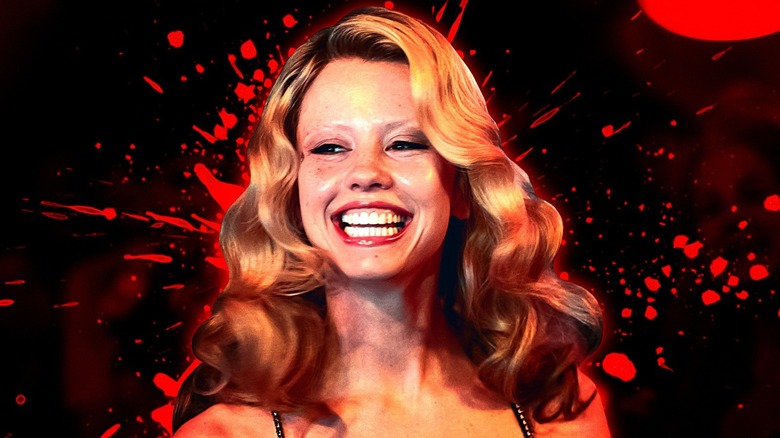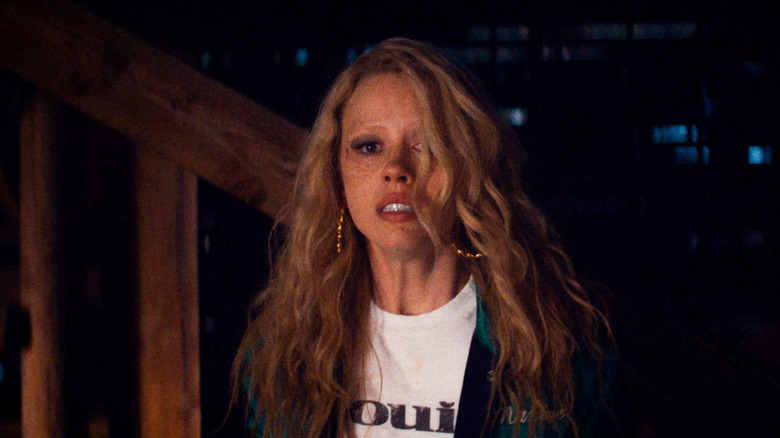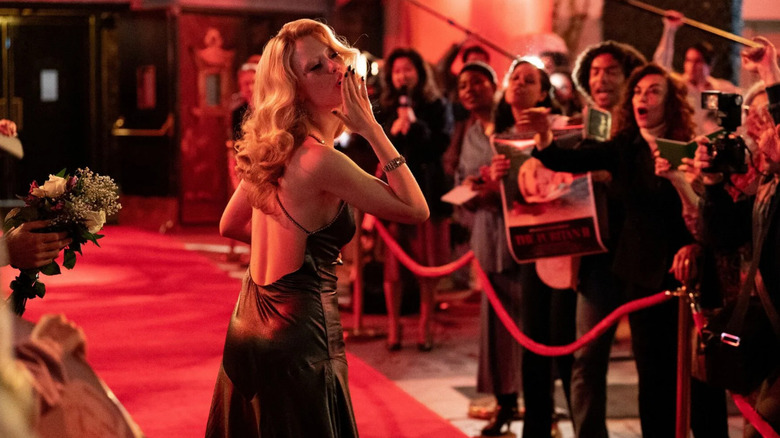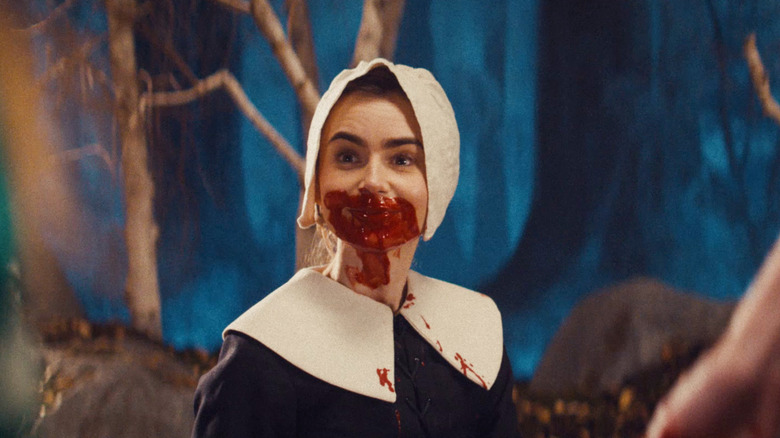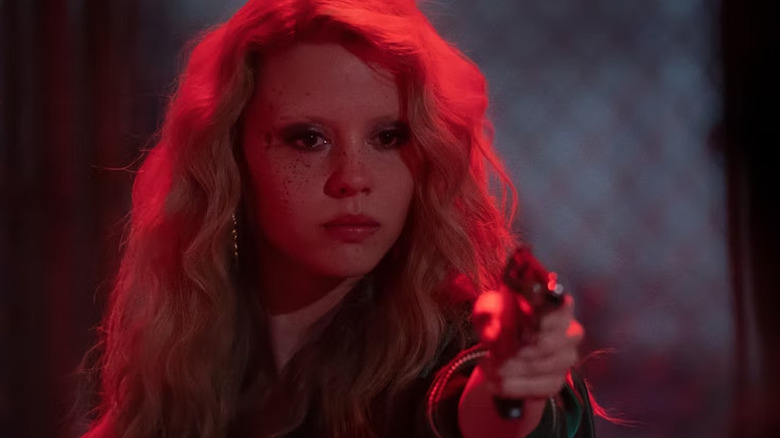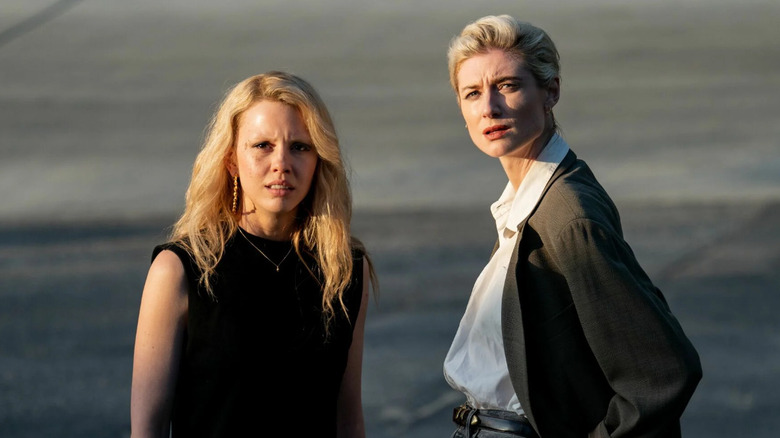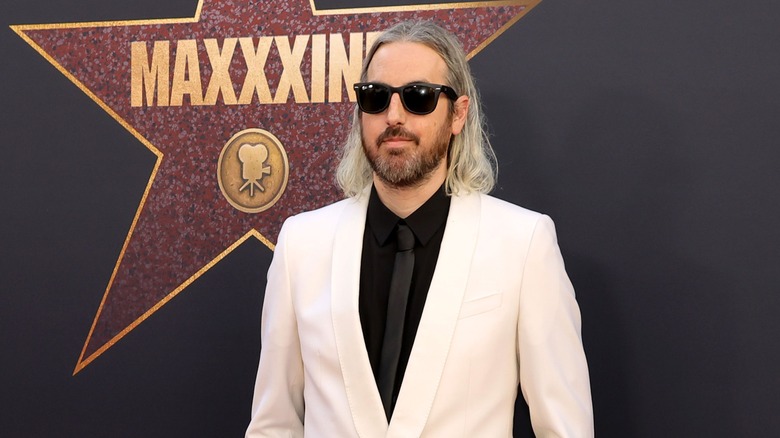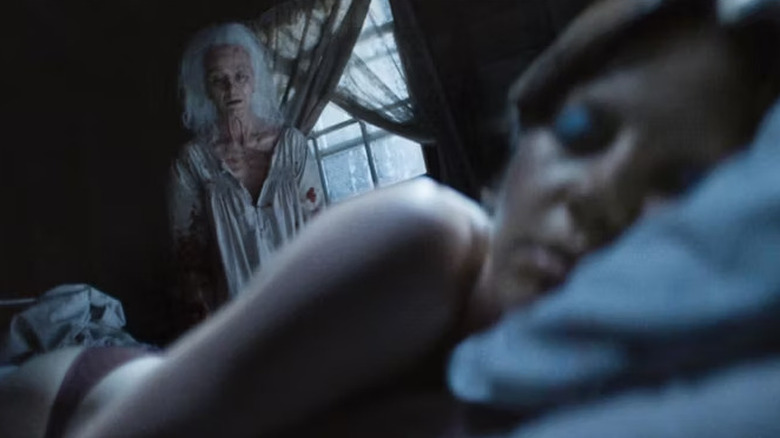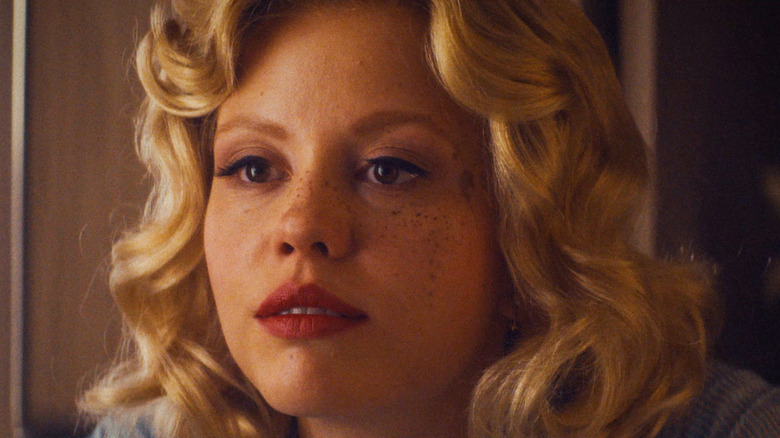The Ending Of Maxxxine Explained
Contains spoilers for "Maxxxine"
2024's "Maxxxine" is the third film in A24's trilogy of horror films that started with 2022's "X," followed by the surprise prequel "Pearl," released later the same year. All three films are directed, written, produced, and edited by Ti West and star new horror icon Mia Goth. In "X" and "Maxxxine," Goth plays porn star Maxine Minx, and in "X" and "Pearl," she portrays Pearl, the dangerous daughter of a farmer.
"Maxxxine" is set in 1985, six years after the titular Maxine Minx survived the violent onslaught at the end of "X." Maxine is now living in Hollywood trying to make it as a legitimate actor after working in porn for so long. However, things go awry as cultish murders begin spreading throughout Hollywood, with the victims mainly being young, beautiful women. The murders themselves are being carried out by a man clad head-to-toe in all black leather (as well as a black mask covering his face), who seems to be a mysterious and powerful producer who lures women — particularly those close to Maxine — to his palatial mansion near the Hollywood sign to kill them. Worse, it's eventually revealed that the murderer is connected to Maxine's past. So will Maxine survive the crazed killer? What does the film have to do with "X" and "Pearl"? And what is the film trying to say about violence, horror, and the culture around it? Find out below as we unpack the ending of "Maxxxine."
What you need to remember about the plot of Maxxxine
The film begins in 1959 with a grainy black-and-white film reel of Maxine as a child performing in front of her father on a stage as he records her, as he gives Maxine words of encouragement off-screen. We then cut to 1985 as Maxine enters a studio lot, ready to audition for a horror film called "Puritan II," which is being helmed by a female director, Elizabeth Bender (Elizabeth Debicki). Despite that Maxine is a famous (or rather, infamous) porn actress living in Hollywood after her experience in "X," the director sees something special in Maxine and gives her the part (against the studio's wishes).
After Maxine gets the role, however, she's accosted by sleazy private investigator John Labat (Kevin Bacon). Labat, it turns out, works for a serial killer who wears all black leather, brutally killing off people close to Maxine, including her porn star friends. These murders, of course, start affecting Maxine mentally, and she begins reliving her trauma from the disturbing experiences she had on the isolated farm in "X." Eventually, the police get involved, further complicating Maxine's life. Bender, the director of "Puritan II," even tells Maxine that this behind-the-scenes drama might cost her the role. Maxine resolves to find a way to stop these murders and find her connection to them — her starring role and her dreams all hang in the balance.
What happened at the end of Maxxxine?
While Maxine is initially dismissive of the other victims, even telling one of the police detectives that "They should save themselves. I did," she eventually decides to take matters into her own hands once and for all. This includes her and her agent, Teddy (Giancarlo Esposito), killing the private investigator violently (by crushing him in an industrial trash compactor while he's trapped inside a car). Maxine also remembers that most of her friends were killed after they were invited to a mysterious producer's mansion, so when she's invited to the same place, she decides it's her opportunity to stop the killer once and for all.
Unfortunately, things go awry as she is overpowered and tied up ritualistically to a palm tree. Worse, it turns out that the black leather-clad killer is in fact her father (Simon Prast) — a televangelist heard throughout the previous film, "X"! Furthermore, he is filming the ritual for a documentary he's producing with his religious cult. Luckily for Maxine, she is followed by two detectives (Michelle Monaghan and Bobby Cannavale), who save her by killing the cult members in a bloody shootout. Maxine makes the killing blow by shooting her injured father's face point-blank with a shotgun. After the carnage, Maxine's dreams come true — she's filming on the set of "Puritan II" and is possibly getting a movie made based on her life. She's finally a star!
What the end of Maxxxine means
If there's one overarching theme in "Maxxxine," it's losing one's self to obsession. Maxine's drive to become a star becomes her one defining trait, and it leads her down dark paths and makes her violent and cold to the suffering around her. It's only when she decides to think outside herself that she's able to confront her past and her demons, and truly succeed. Her single-mindedness, it turns out, is a strength ... but also a major weakness. Finding a way to navigate and manage her desires effectively is how she prevails in the end. In fact, Pearl — both in "Pearl" and in "X" — shows the dangerous path Maxine could've tragically fallen into. The casting of Mia Goth in both roles takes on special meaning when you consider both characters as reflections of each other.
Furthermore, everyone in the film is obsessed with fame. This includes Detective Torres (Bobby Cannavale), who tried to be an actor before being a cop and whose bravado leads to his untimely demise. This obsession with fame also consumes the main villain, who is attempting to use entertainment media for his own ends as well. He is purposely using Maxine's fame — or, in his mind, infamy — as a popular porn star and rising Hollywood actress to push his own, twisted religious agenda by making her the focal point of his anti-Hollywood documentary. The film ultimately warns that this singular obsession essentially harms everything it touches if not checked.
The problem with religious hypocrisy
Throughout the film, there's a small but vocal group of conservatives protesting "Puritan II," the movie-within-a-movie that Maxine is starring in. Beyond the violence and sex depicted in the fictional horror film, it also has explicit religious themes — and since "Maxxxine" is set in 1985, it's smack-dab in the Reagan-era Satanic Moral Panic (which was also explored in "Stranger Things" Season 4). So many "moral majority" religious extremists of the time have taken offense to the production of "Puritan II" in "Maxxxine." However, the religious extremists in the film, despite decrying the aforementioned violence of the film, are themselves enacting heinous, violent acts upon innocent people.
This is also a parallel to real life as well, where conservative extremists will, for instance, decry abortion as murder, but then blow up abortion clinics and kill innocent people, or call LGBTQ+ people "groomers" while supporting politicians who won't raise the minimum age of consent and minimum age of marriage and religious institutions with decades-long histories of assaulting children.
Beyond that, Maxine's father's cult is exploiting the entertainment pipeline, which is commenting on what started in earnest in the '80s with the rising popularity of conservative personalities like Rush Limbaugh, which has (unfortunately) led to modern-day conservative media acolytes like Jordan Peterson, Joe Rogan, and The Daily Wire. Despite being set in the '80s, West's film comments on the current-era culture wars, even if such connections are unintentional. "Maxxxine" explores how our modern cultural divide got so increasingly politicized and connected explicitly to entertainment.
Maxine literally destroys the patriarchy
It is eventually revealed that the main antagonist in all black leather killing Maxine's friends turns out to be Maxine's overly-religious father. During the film, he had been secretly producing his own faith-based propaganda film, attempting to use Maxine and the production of her film "Puritan II" as the documentary's focal point. However, as also mentioned earlier, in the end he is defeated by Maxine victoriously blowing his head off with a shotgun. In this way, Maxine is both figuratively — and literally — destroying the patriarchy with her actions. She is at once killing her father, or patriarch, but also defying the patriarchal cult he had amassed within the also male-dominated entertainment industry in Hollywood.
His defeat is due to Maxine deciding to protect Lily Collins' character — also an up-and-coming actress — who was going to meet a "mysterious producer" who happened to be Maxine's fundamentalist father. While Maxine is too late to save the actress, Maxine's actions nonetheless ultimately cause the police to get involved and take out the cult alongside her. So Maxine's solidarity and willingness to sacrifice her own well-being to protect another woman in peril is what fortunately leads to the final demise of a misogynistic, patriarchal, and murderous cult.
Challenging the status quo
Elizabeth Debicki plays Elizabeth Bender, the director of the fake horror film-within-a-film "Puritan II," who takes Maxine under her wing after giving Maxine her big break. At one point Bender describes, explicitly in dialogue, the necessity of female perspective in horror and why it's important to shake things up and challenge the status quo. In essence, she and the film are arguing that art is meant to be challenging. It's supposed to question foundational truths that may be rooted in biases and an attempt to oppress and subjugate. Even the fact that "Maxxxine" features a porn star heroine is still sadly transgressive even today, given how sex workers are still being mistreated by payment centers for their work and courts are often dismissive of their sexual assault cases.
Essentially, both Bender's fictional horror film and Ti West's "X" horror trilogy reflect the trauma women face. Bender even explains to Maxine that "Puritan II" is going to be set in the '50s because "it was just as f***ed up then too," the same way that "X" and "Pearl" show the seedy underbelly of society and how it enables and runs on the subjugation of women.
What have the cast and crew of Maxxxine said about the ending?
After an early screening prior to the official release date of "Maxxxine," director Ti West spoke during a Q&A session at the Alamo Drafthouse theater in downtown LA. One of the questions he was asked was about the potential significance of the Betty Davis quote, "Until you're known in my profession as a monster, you're not a star," which opens the film, and then book-ending the film with the song "Betty Davis Eyes" by artist Kim Carnes. After thinking about it for a moment, West said that the bookends of the film embody, quote, "a strange feeling of the movie business, what it takes to achieve something that is so unlikely to achieve," though he also reiterated later that the ending "can be interpreted in many ways," visibly uncomfortable about being pressed to give a definitive answer.
This reiterates the main theme of the film, as well as the horror trilogy as a whole, which concerns the intense obsession with fame and the issues that arise both personally and mentally in the pursuit of it. Essentially, while it takes a lot to achieve the impossible, it can also cause one to lose themselves in the attempt to achieve it. For instance, Pearl became a monster of jealousy and envy, while Maxine very nearly finds herself becoming callous to the potential suffering of others, as well as the violent way she deposes of obstacles like Kevin Bacon's sleazy PI or a potential rapist dressed like Buster Keaton.
What the end of Maxxxine could mean for the franchise
Since this particular horror series, starting with "X," jumps decades between each film — starting with the 1970s in "X," the 1910s in the prequel "Pearl," and finally the 1980s in "Maxxxine" — there's a possibility Ti West can continue deconstructing Hollywood, filmmaking, sex in films, and horror's place in it all by setting it a follow-up film in another decade. It could be the 1990s, or even set it in the modern day with Mia Goth playing someone else who's ambitious and navigating the entertainment industry and sex in entertainment. Goth could even return in old-age makeup, as she donned in "X," to play an older Maxine alongside a new protagonist. Maxine would differ as an older actress with a modicum of success, as compared to how resentful Pearl was in "X."
Another potential avenue is following through on the tease at the end of "Maxxxine" of a Maxine Minx biopic. West would surely have fun revisiting this character as she participates behind the scenes in the telling of her life story. Maybe there can be some clashes between her and whatever actress is cast as her younger self. But that speculative future likely depends on how successful "Maxxxine" is with audiences — "X" and "Pearl" both made their money back tenfold, but "Maxxxine" has a larger budget than either of its predecessors. A24 isn't exactly in the franchise business, either, so it'd be surprising if West and A24 chose to continue the "X" story after "Maxxxine."
Maxxxine's possible alternate ending
It seems relatively conclusive that at the end of "Maxxxine," the titular Maxine finally gets everything she wanted by becoming a bonafide movie star in a legitimate (if admittedly schlocky) Hollywood feature film. However, there's a tragic possibility that the whole last sequence is all in her head. To be clear, we don't necessarily endorse this reading – as it's often a needlessly cliche trope – but there are hints of the possibility throughout the film nonetheless.
At the end of the film, after Maxine's father's cult is completely taken out and he's bleeding to death behind the Hollywood sign, Maxine points a shotgun at him. Unfortunately, right before that, a police helicopter shines a spotlight on her, telling her to put the weapon down, which she refuses to do. Then, in the middle of that sequence — but before the final one — she seemingly hallucinates the movie premiere (the actual ending has her on set still filming "Puritan II") before cutting back to being spotlighted by the helicopter again. So is the film randomly nonlinear at the end ... or is everything after she shoots her father's head off a hallucination while she's rotting in jail? Is it a vision of a potential life cut short by police shooting her dead?
This isn't an isolated instance of Maxine experiencing vivid memories and fantasies. Maxine hallucinates throughout the movie before the end, mostly about her experiences in "X." But the most vital clue that something isn't quite right about the ending is the "Maxxxine" Hollywood sign during the closing credits — is it an artistic flourish, or is it a clue that Maxine's story is more fantasy than fact?
